Exploring Leadership and Management Roles in Tesco's Operations
VerifiedAdded on 2022/11/29
|15
|4899
|490
Report
AI Summary
This report provides an in-depth analysis of leadership and management practices within Tesco, a global retail giant. It begins by defining and comparing the roles and characteristics of leaders and managers, highlighting their distinct responsibilities and contributions to organizational success. The report then examines how these roles apply in different organizational contexts, using examples such as recruitment drives and new product launches. It explores various leadership theories and models, including the Great Man Theory, Trait Theory, Contingency Theory, Situational Theory, and Behavioral Theory, and assesses their relevance to Tesco's operations. Furthermore, the report delves into key approaches to operations management, such as Six Sigma, and elucidates the roles of leaders and managers in this domain. Finally, it identifies and assesses factors within the business environment that impact operational management and decision-making by leaders and managers, providing a comprehensive overview of leadership and management in a contemporary business setting.
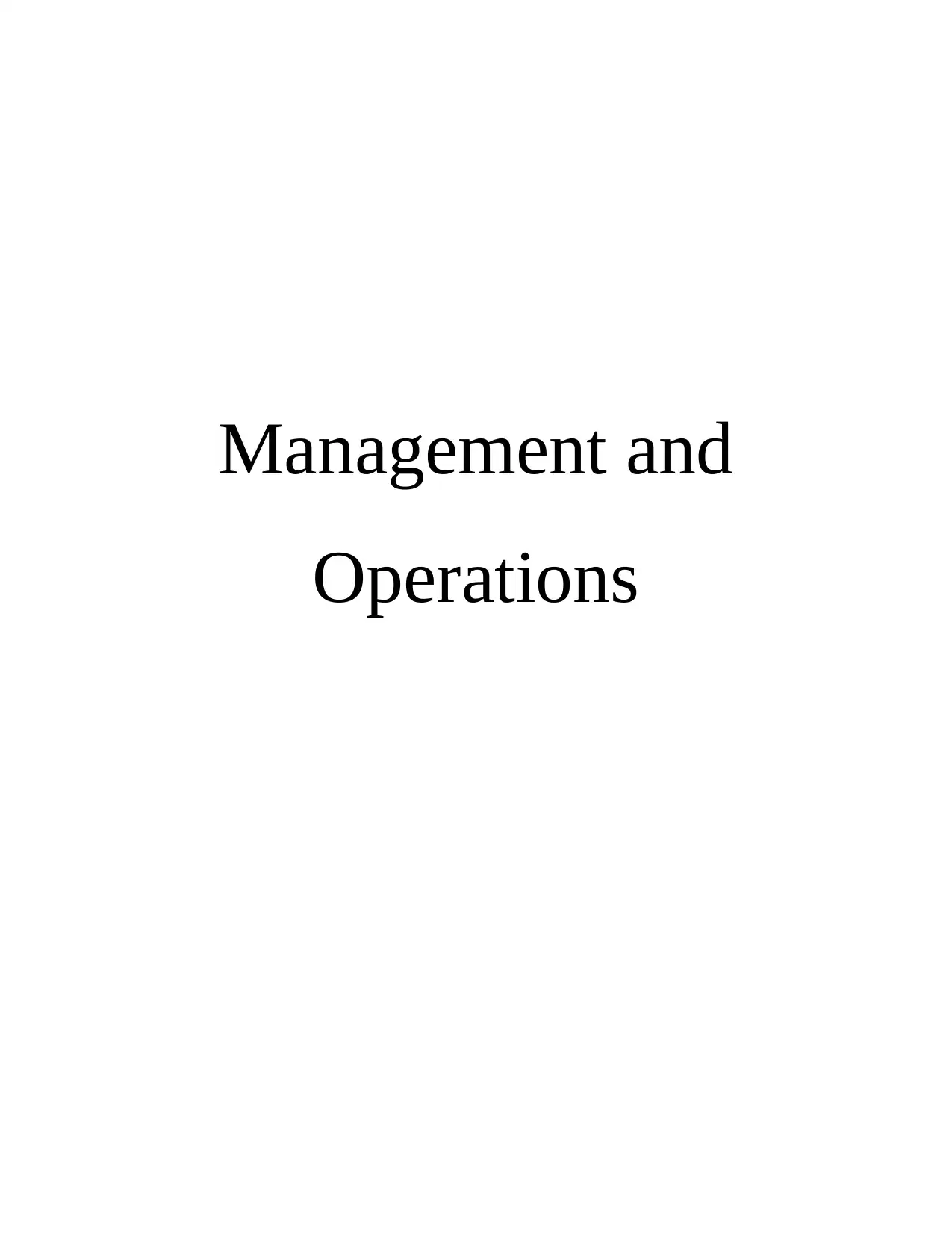
Management and
Operations
Operations
Paraphrase This Document
Need a fresh take? Get an instant paraphrase of this document with our AI Paraphraser
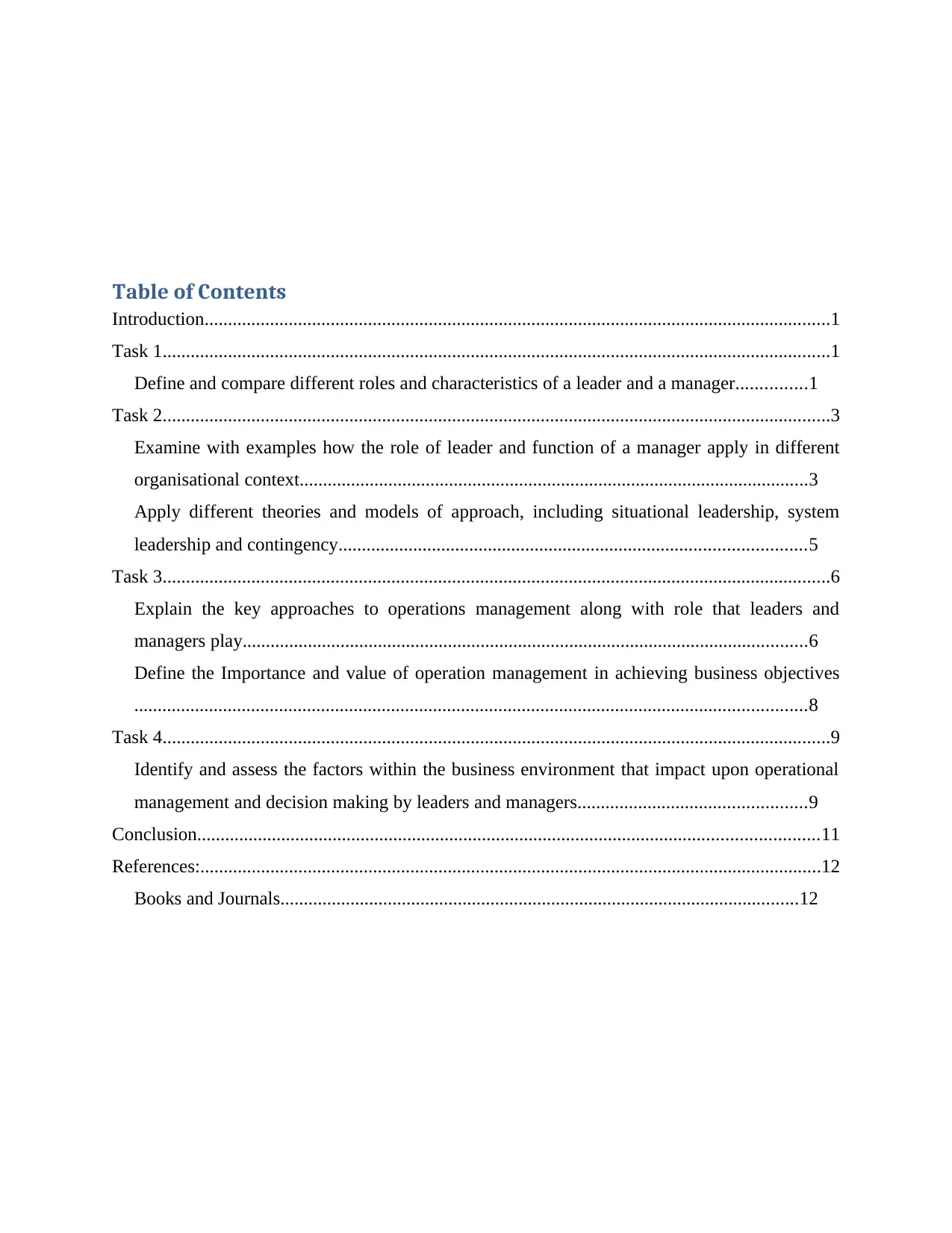
Table of Contents
Introduction......................................................................................................................................1
Task 1...............................................................................................................................................1
Define and compare different roles and characteristics of a leader and a manager...............1
Task 2...............................................................................................................................................3
Examine with examples how the role of leader and function of a manager apply in different
organisational context.............................................................................................................3
Apply different theories and models of approach, including situational leadership, system
leadership and contingency....................................................................................................5
Task 3...............................................................................................................................................6
Explain the key approaches to operations management along with role that leaders and
managers play.........................................................................................................................6
Define the Importance and value of operation management in achieving business objectives
................................................................................................................................................8
Task 4...............................................................................................................................................9
Identify and assess the factors within the business environment that impact upon operational
management and decision making by leaders and managers.................................................9
Conclusion.....................................................................................................................................11
References:.....................................................................................................................................12
Books and Journals...............................................................................................................12
Introduction......................................................................................................................................1
Task 1...............................................................................................................................................1
Define and compare different roles and characteristics of a leader and a manager...............1
Task 2...............................................................................................................................................3
Examine with examples how the role of leader and function of a manager apply in different
organisational context.............................................................................................................3
Apply different theories and models of approach, including situational leadership, system
leadership and contingency....................................................................................................5
Task 3...............................................................................................................................................6
Explain the key approaches to operations management along with role that leaders and
managers play.........................................................................................................................6
Define the Importance and value of operation management in achieving business objectives
................................................................................................................................................8
Task 4...............................................................................................................................................9
Identify and assess the factors within the business environment that impact upon operational
management and decision making by leaders and managers.................................................9
Conclusion.....................................................................................................................................11
References:.....................................................................................................................................12
Books and Journals...............................................................................................................12
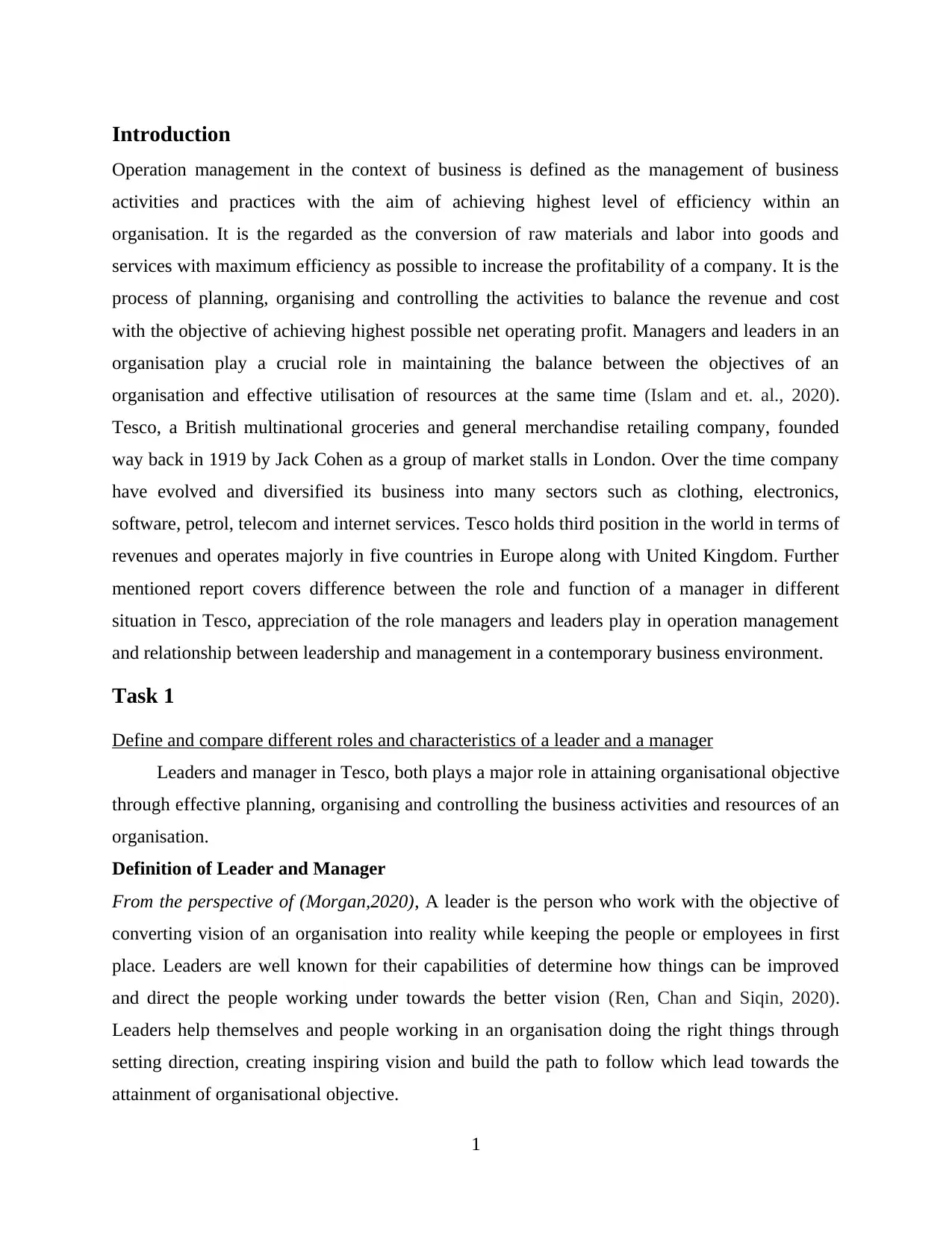
Introduction
Operation management in the context of business is defined as the management of business
activities and practices with the aim of achieving highest level of efficiency within an
organisation. It is the regarded as the conversion of raw materials and labor into goods and
services with maximum efficiency as possible to increase the profitability of a company. It is the
process of planning, organising and controlling the activities to balance the revenue and cost
with the objective of achieving highest possible net operating profit. Managers and leaders in an
organisation play a crucial role in maintaining the balance between the objectives of an
organisation and effective utilisation of resources at the same time (Islam and et. al., 2020).
Tesco, a British multinational groceries and general merchandise retailing company, founded
way back in 1919 by Jack Cohen as a group of market stalls in London. Over the time company
have evolved and diversified its business into many sectors such as clothing, electronics,
software, petrol, telecom and internet services. Tesco holds third position in the world in terms of
revenues and operates majorly in five countries in Europe along with United Kingdom. Further
mentioned report covers difference between the role and function of a manager in different
situation in Tesco, appreciation of the role managers and leaders play in operation management
and relationship between leadership and management in a contemporary business environment.
Task 1
Define and compare different roles and characteristics of a leader and a manager
Leaders and manager in Tesco, both plays a major role in attaining organisational objective
through effective planning, organising and controlling the business activities and resources of an
organisation.
Definition of Leader and Manager
From the perspective of (Morgan,2020), A leader is the person who work with the objective of
converting vision of an organisation into reality while keeping the people or employees in first
place. Leaders are well known for their capabilities of determine how things can be improved
and direct the people working under towards the better vision (Ren, Chan and Siqin, 2020).
Leaders help themselves and people working in an organisation doing the right things through
setting direction, creating inspiring vision and build the path to follow which lead towards the
attainment of organisational objective.
1
Operation management in the context of business is defined as the management of business
activities and practices with the aim of achieving highest level of efficiency within an
organisation. It is the regarded as the conversion of raw materials and labor into goods and
services with maximum efficiency as possible to increase the profitability of a company. It is the
process of planning, organising and controlling the activities to balance the revenue and cost
with the objective of achieving highest possible net operating profit. Managers and leaders in an
organisation play a crucial role in maintaining the balance between the objectives of an
organisation and effective utilisation of resources at the same time (Islam and et. al., 2020).
Tesco, a British multinational groceries and general merchandise retailing company, founded
way back in 1919 by Jack Cohen as a group of market stalls in London. Over the time company
have evolved and diversified its business into many sectors such as clothing, electronics,
software, petrol, telecom and internet services. Tesco holds third position in the world in terms of
revenues and operates majorly in five countries in Europe along with United Kingdom. Further
mentioned report covers difference between the role and function of a manager in different
situation in Tesco, appreciation of the role managers and leaders play in operation management
and relationship between leadership and management in a contemporary business environment.
Task 1
Define and compare different roles and characteristics of a leader and a manager
Leaders and manager in Tesco, both plays a major role in attaining organisational objective
through effective planning, organising and controlling the business activities and resources of an
organisation.
Definition of Leader and Manager
From the perspective of (Morgan,2020), A leader is the person who work with the objective of
converting vision of an organisation into reality while keeping the people or employees in first
place. Leaders are well known for their capabilities of determine how things can be improved
and direct the people working under towards the better vision (Ren, Chan and Siqin, 2020).
Leaders help themselves and people working in an organisation doing the right things through
setting direction, creating inspiring vision and build the path to follow which lead towards the
attainment of organisational objective.
1
⊘ This is a preview!⊘
Do you want full access?
Subscribe today to unlock all pages.

Trusted by 1+ million students worldwide
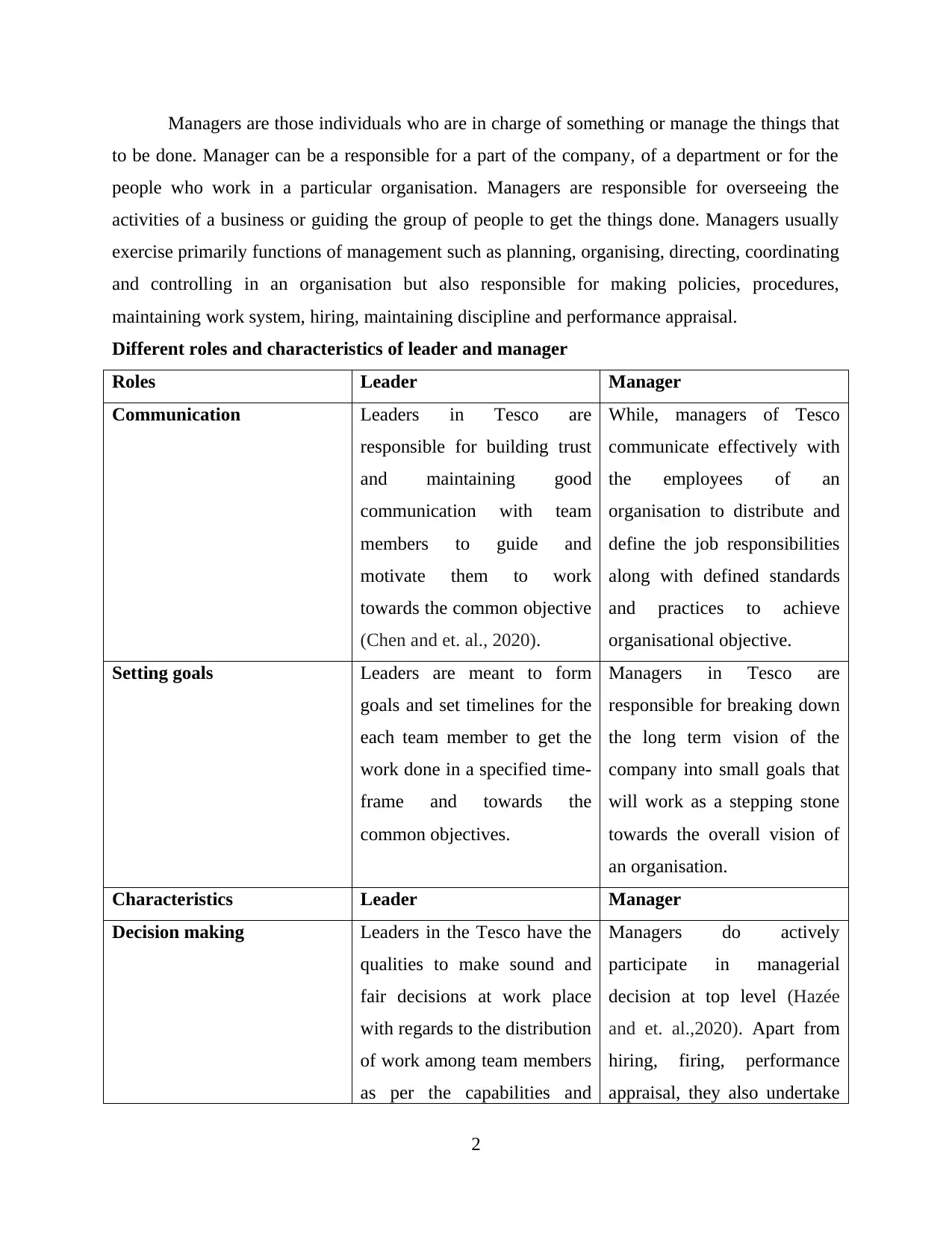
Managers are those individuals who are in charge of something or manage the things that
to be done. Manager can be a responsible for a part of the company, of a department or for the
people who work in a particular organisation. Managers are responsible for overseeing the
activities of a business or guiding the group of people to get the things done. Managers usually
exercise primarily functions of management such as planning, organising, directing, coordinating
and controlling in an organisation but also responsible for making policies, procedures,
maintaining work system, hiring, maintaining discipline and performance appraisal.
Different roles and characteristics of leader and manager
Roles Leader Manager
Communication Leaders in Tesco are
responsible for building trust
and maintaining good
communication with team
members to guide and
motivate them to work
towards the common objective
(Chen and et. al., 2020).
While, managers of Tesco
communicate effectively with
the employees of an
organisation to distribute and
define the job responsibilities
along with defined standards
and practices to achieve
organisational objective.
Setting goals Leaders are meant to form
goals and set timelines for the
each team member to get the
work done in a specified time-
frame and towards the
common objectives.
Managers in Tesco are
responsible for breaking down
the long term vision of the
company into small goals that
will work as a stepping stone
towards the overall vision of
an organisation.
Characteristics Leader Manager
Decision making Leaders in the Tesco have the
qualities to make sound and
fair decisions at work place
with regards to the distribution
of work among team members
as per the capabilities and
Managers do actively
participate in managerial
decision at top level (Hazée
and et. al.,2020). Apart from
hiring, firing, performance
appraisal, they also undertake
2
to be done. Manager can be a responsible for a part of the company, of a department or for the
people who work in a particular organisation. Managers are responsible for overseeing the
activities of a business or guiding the group of people to get the things done. Managers usually
exercise primarily functions of management such as planning, organising, directing, coordinating
and controlling in an organisation but also responsible for making policies, procedures,
maintaining work system, hiring, maintaining discipline and performance appraisal.
Different roles and characteristics of leader and manager
Roles Leader Manager
Communication Leaders in Tesco are
responsible for building trust
and maintaining good
communication with team
members to guide and
motivate them to work
towards the common objective
(Chen and et. al., 2020).
While, managers of Tesco
communicate effectively with
the employees of an
organisation to distribute and
define the job responsibilities
along with defined standards
and practices to achieve
organisational objective.
Setting goals Leaders are meant to form
goals and set timelines for the
each team member to get the
work done in a specified time-
frame and towards the
common objectives.
Managers in Tesco are
responsible for breaking down
the long term vision of the
company into small goals that
will work as a stepping stone
towards the overall vision of
an organisation.
Characteristics Leader Manager
Decision making Leaders in the Tesco have the
qualities to make sound and
fair decisions at work place
with regards to the distribution
of work among team members
as per the capabilities and
Managers do actively
participate in managerial
decision at top level (Hazée
and et. al.,2020). Apart from
hiring, firing, performance
appraisal, they also undertake
2
Paraphrase This Document
Need a fresh take? Get an instant paraphrase of this document with our AI Paraphraser
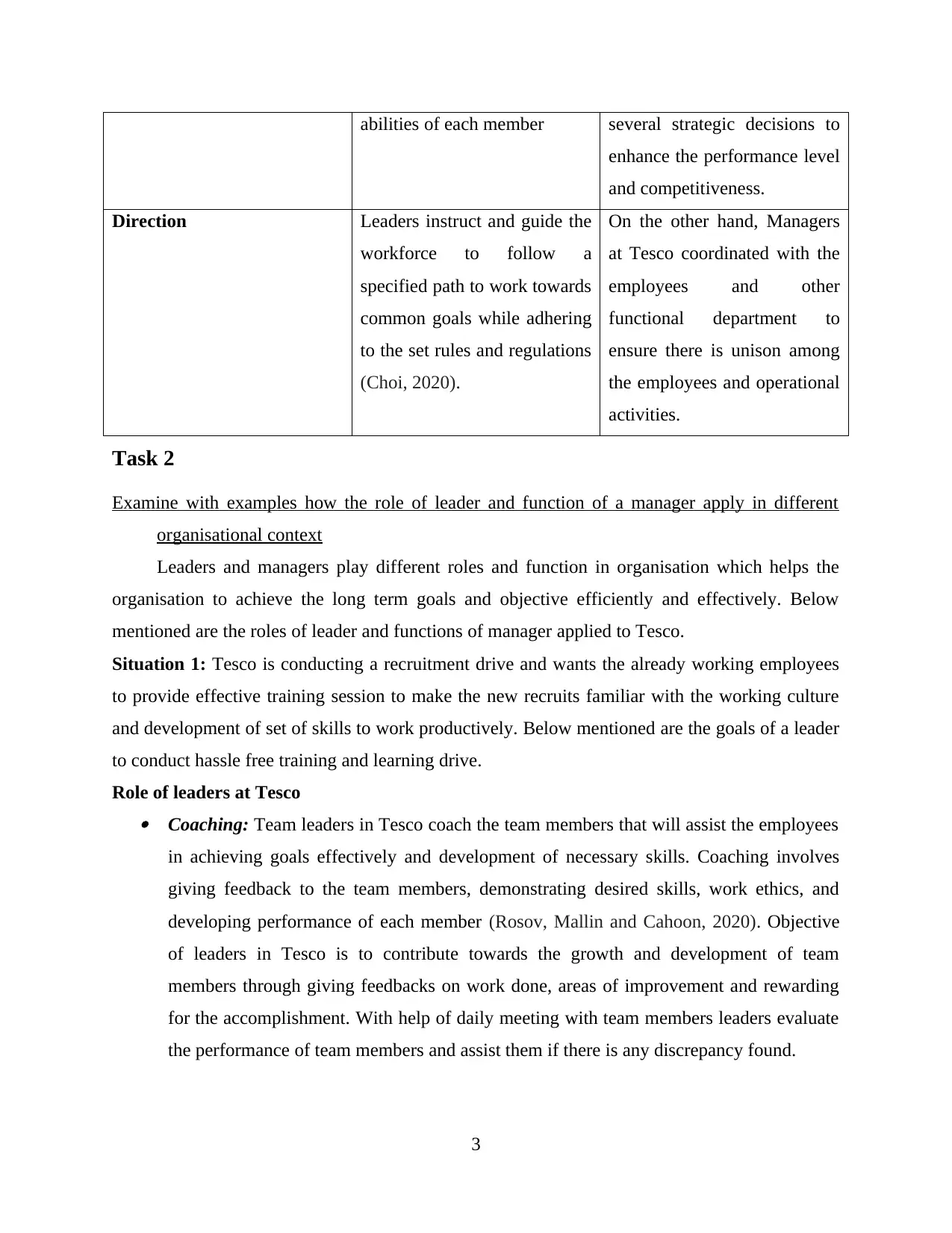
abilities of each member several strategic decisions to
enhance the performance level
and competitiveness.
Direction Leaders instruct and guide the
workforce to follow a
specified path to work towards
common goals while adhering
to the set rules and regulations
(Choi, 2020).
On the other hand, Managers
at Tesco coordinated with the
employees and other
functional department to
ensure there is unison among
the employees and operational
activities.
Task 2
Examine with examples how the role of leader and function of a manager apply in different
organisational context
Leaders and managers play different roles and function in organisation which helps the
organisation to achieve the long term goals and objective efficiently and effectively. Below
mentioned are the roles of leader and functions of manager applied to Tesco.
Situation 1: Tesco is conducting a recruitment drive and wants the already working employees
to provide effective training session to make the new recruits familiar with the working culture
and development of set of skills to work productively. Below mentioned are the goals of a leader
to conduct hassle free training and learning drive.
Role of leaders at Tesco Coaching: Team leaders in Tesco coach the team members that will assist the employees
in achieving goals effectively and development of necessary skills. Coaching involves
giving feedback to the team members, demonstrating desired skills, work ethics, and
developing performance of each member (Rosov, Mallin and Cahoon, 2020). Objective
of leaders in Tesco is to contribute towards the growth and development of team
members through giving feedbacks on work done, areas of improvement and rewarding
for the accomplishment. With help of daily meeting with team members leaders evaluate
the performance of team members and assist them if there is any discrepancy found.
3
enhance the performance level
and competitiveness.
Direction Leaders instruct and guide the
workforce to follow a
specified path to work towards
common goals while adhering
to the set rules and regulations
(Choi, 2020).
On the other hand, Managers
at Tesco coordinated with the
employees and other
functional department to
ensure there is unison among
the employees and operational
activities.
Task 2
Examine with examples how the role of leader and function of a manager apply in different
organisational context
Leaders and managers play different roles and function in organisation which helps the
organisation to achieve the long term goals and objective efficiently and effectively. Below
mentioned are the roles of leader and functions of manager applied to Tesco.
Situation 1: Tesco is conducting a recruitment drive and wants the already working employees
to provide effective training session to make the new recruits familiar with the working culture
and development of set of skills to work productively. Below mentioned are the goals of a leader
to conduct hassle free training and learning drive.
Role of leaders at Tesco Coaching: Team leaders in Tesco coach the team members that will assist the employees
in achieving goals effectively and development of necessary skills. Coaching involves
giving feedback to the team members, demonstrating desired skills, work ethics, and
developing performance of each member (Rosov, Mallin and Cahoon, 2020). Objective
of leaders in Tesco is to contribute towards the growth and development of team
members through giving feedbacks on work done, areas of improvement and rewarding
for the accomplishment. With help of daily meeting with team members leaders evaluate
the performance of team members and assist them if there is any discrepancy found.
3
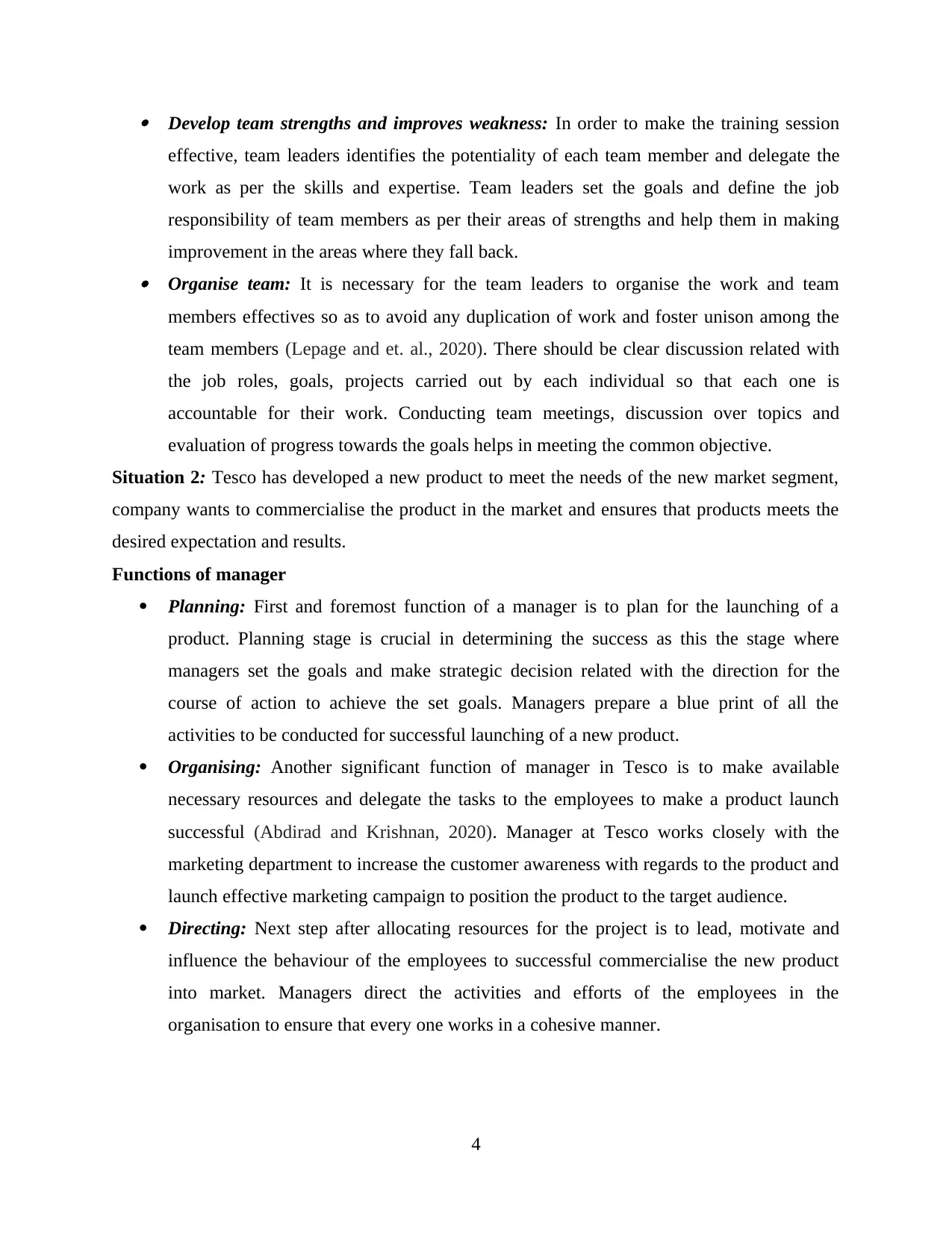
Develop team strengths and improves weakness: In order to make the training session
effective, team leaders identifies the potentiality of each team member and delegate the
work as per the skills and expertise. Team leaders set the goals and define the job
responsibility of team members as per their areas of strengths and help them in making
improvement in the areas where they fall back. Organise team: It is necessary for the team leaders to organise the work and team
members effectives so as to avoid any duplication of work and foster unison among the
team members (Lepage and et. al., 2020). There should be clear discussion related with
the job roles, goals, projects carried out by each individual so that each one is
accountable for their work. Conducting team meetings, discussion over topics and
evaluation of progress towards the goals helps in meeting the common objective.
Situation 2: Tesco has developed a new product to meet the needs of the new market segment,
company wants to commercialise the product in the market and ensures that products meets the
desired expectation and results.
Functions of manager
Planning: First and foremost function of a manager is to plan for the launching of a
product. Planning stage is crucial in determining the success as this the stage where
managers set the goals and make strategic decision related with the direction for the
course of action to achieve the set goals. Managers prepare a blue print of all the
activities to be conducted for successful launching of a new product.
Organising: Another significant function of manager in Tesco is to make available
necessary resources and delegate the tasks to the employees to make a product launch
successful (Abdirad and Krishnan, 2020). Manager at Tesco works closely with the
marketing department to increase the customer awareness with regards to the product and
launch effective marketing campaign to position the product to the target audience.
Directing: Next step after allocating resources for the project is to lead, motivate and
influence the behaviour of the employees to successful commercialise the new product
into market. Managers direct the activities and efforts of the employees in the
organisation to ensure that every one works in a cohesive manner.
4
effective, team leaders identifies the potentiality of each team member and delegate the
work as per the skills and expertise. Team leaders set the goals and define the job
responsibility of team members as per their areas of strengths and help them in making
improvement in the areas where they fall back. Organise team: It is necessary for the team leaders to organise the work and team
members effectives so as to avoid any duplication of work and foster unison among the
team members (Lepage and et. al., 2020). There should be clear discussion related with
the job roles, goals, projects carried out by each individual so that each one is
accountable for their work. Conducting team meetings, discussion over topics and
evaluation of progress towards the goals helps in meeting the common objective.
Situation 2: Tesco has developed a new product to meet the needs of the new market segment,
company wants to commercialise the product in the market and ensures that products meets the
desired expectation and results.
Functions of manager
Planning: First and foremost function of a manager is to plan for the launching of a
product. Planning stage is crucial in determining the success as this the stage where
managers set the goals and make strategic decision related with the direction for the
course of action to achieve the set goals. Managers prepare a blue print of all the
activities to be conducted for successful launching of a new product.
Organising: Another significant function of manager in Tesco is to make available
necessary resources and delegate the tasks to the employees to make a product launch
successful (Abdirad and Krishnan, 2020). Manager at Tesco works closely with the
marketing department to increase the customer awareness with regards to the product and
launch effective marketing campaign to position the product to the target audience.
Directing: Next step after allocating resources for the project is to lead, motivate and
influence the behaviour of the employees to successful commercialise the new product
into market. Managers direct the activities and efforts of the employees in the
organisation to ensure that every one works in a cohesive manner.
4
⊘ This is a preview!⊘
Do you want full access?
Subscribe today to unlock all pages.

Trusted by 1+ million students worldwide
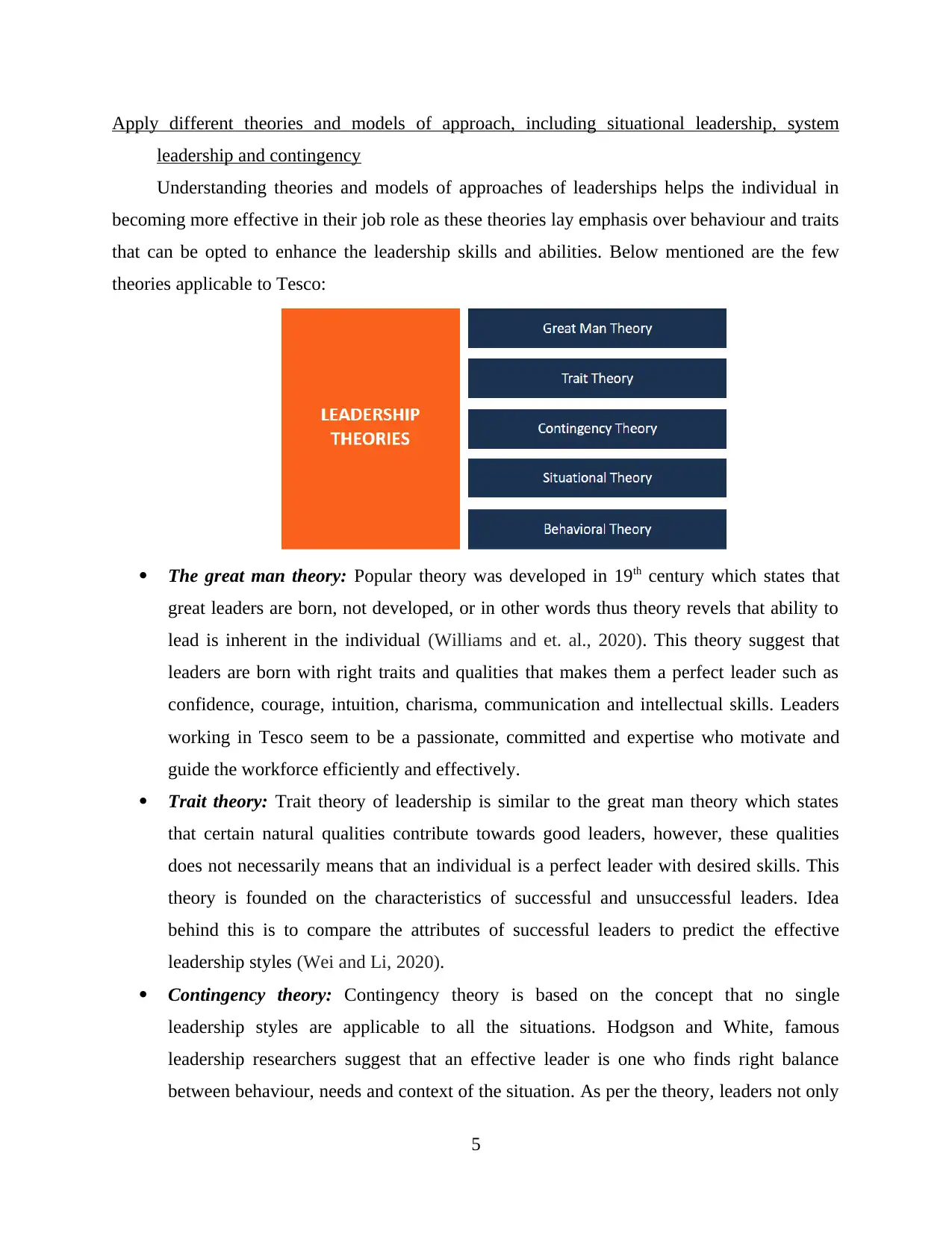
Apply different theories and models of approach, including situational leadership, system
leadership and contingency
Understanding theories and models of approaches of leaderships helps the individual in
becoming more effective in their job role as these theories lay emphasis over behaviour and traits
that can be opted to enhance the leadership skills and abilities. Below mentioned are the few
theories applicable to Tesco:
The great man theory: Popular theory was developed in 19th century which states that
great leaders are born, not developed, or in other words thus theory revels that ability to
lead is inherent in the individual (Williams and et. al., 2020). This theory suggest that
leaders are born with right traits and qualities that makes them a perfect leader such as
confidence, courage, intuition, charisma, communication and intellectual skills. Leaders
working in Tesco seem to be a passionate, committed and expertise who motivate and
guide the workforce efficiently and effectively.
Trait theory: Trait theory of leadership is similar to the great man theory which states
that certain natural qualities contribute towards good leaders, however, these qualities
does not necessarily means that an individual is a perfect leader with desired skills. This
theory is founded on the characteristics of successful and unsuccessful leaders. Idea
behind this is to compare the attributes of successful leaders to predict the effective
leadership styles (Wei and Li, 2020).
Contingency theory: Contingency theory is based on the concept that no single
leadership styles are applicable to all the situations. Hodgson and White, famous
leadership researchers suggest that an effective leader is one who finds right balance
between behaviour, needs and context of the situation. As per the theory, leaders not only
5
leadership and contingency
Understanding theories and models of approaches of leaderships helps the individual in
becoming more effective in their job role as these theories lay emphasis over behaviour and traits
that can be opted to enhance the leadership skills and abilities. Below mentioned are the few
theories applicable to Tesco:
The great man theory: Popular theory was developed in 19th century which states that
great leaders are born, not developed, or in other words thus theory revels that ability to
lead is inherent in the individual (Williams and et. al., 2020). This theory suggest that
leaders are born with right traits and qualities that makes them a perfect leader such as
confidence, courage, intuition, charisma, communication and intellectual skills. Leaders
working in Tesco seem to be a passionate, committed and expertise who motivate and
guide the workforce efficiently and effectively.
Trait theory: Trait theory of leadership is similar to the great man theory which states
that certain natural qualities contribute towards good leaders, however, these qualities
does not necessarily means that an individual is a perfect leader with desired skills. This
theory is founded on the characteristics of successful and unsuccessful leaders. Idea
behind this is to compare the attributes of successful leaders to predict the effective
leadership styles (Wei and Li, 2020).
Contingency theory: Contingency theory is based on the concept that no single
leadership styles are applicable to all the situations. Hodgson and White, famous
leadership researchers suggest that an effective leader is one who finds right balance
between behaviour, needs and context of the situation. As per the theory, leaders not only
5
Paraphrase This Document
Need a fresh take? Get an instant paraphrase of this document with our AI Paraphraser
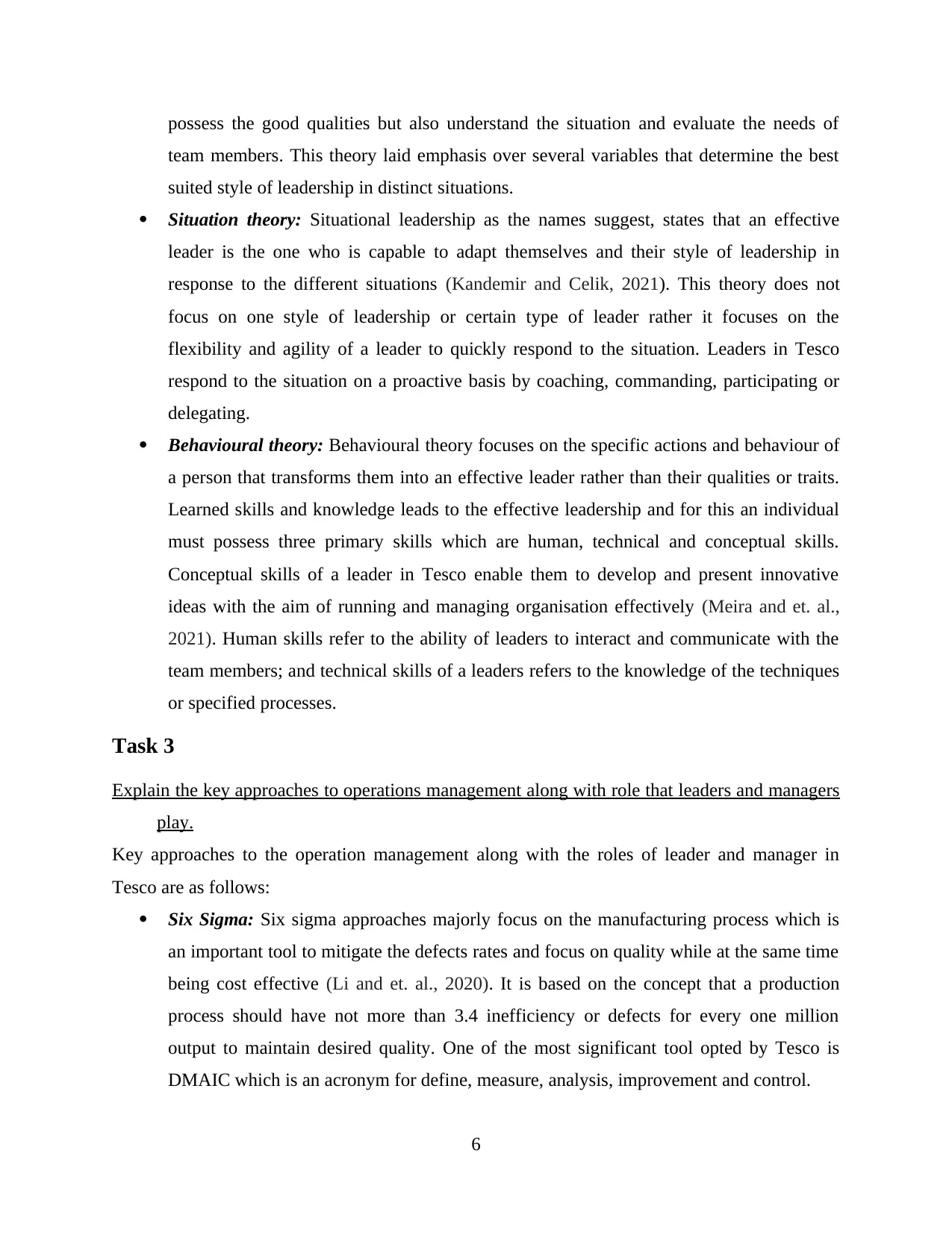
possess the good qualities but also understand the situation and evaluate the needs of
team members. This theory laid emphasis over several variables that determine the best
suited style of leadership in distinct situations.
Situation theory: Situational leadership as the names suggest, states that an effective
leader is the one who is capable to adapt themselves and their style of leadership in
response to the different situations (Kandemir and Celik, 2021). This theory does not
focus on one style of leadership or certain type of leader rather it focuses on the
flexibility and agility of a leader to quickly respond to the situation. Leaders in Tesco
respond to the situation on a proactive basis by coaching, commanding, participating or
delegating.
Behavioural theory: Behavioural theory focuses on the specific actions and behaviour of
a person that transforms them into an effective leader rather than their qualities or traits.
Learned skills and knowledge leads to the effective leadership and for this an individual
must possess three primary skills which are human, technical and conceptual skills.
Conceptual skills of a leader in Tesco enable them to develop and present innovative
ideas with the aim of running and managing organisation effectively (Meira and et. al.,
2021). Human skills refer to the ability of leaders to interact and communicate with the
team members; and technical skills of a leaders refers to the knowledge of the techniques
or specified processes.
Task 3
Explain the key approaches to operations management along with role that leaders and managers
play.
Key approaches to the operation management along with the roles of leader and manager in
Tesco are as follows:
Six Sigma: Six sigma approaches majorly focus on the manufacturing process which is
an important tool to mitigate the defects rates and focus on quality while at the same time
being cost effective (Li and et. al., 2020). It is based on the concept that a production
process should have not more than 3.4 inefficiency or defects for every one million
output to maintain desired quality. One of the most significant tool opted by Tesco is
DMAIC which is an acronym for define, measure, analysis, improvement and control.
6
team members. This theory laid emphasis over several variables that determine the best
suited style of leadership in distinct situations.
Situation theory: Situational leadership as the names suggest, states that an effective
leader is the one who is capable to adapt themselves and their style of leadership in
response to the different situations (Kandemir and Celik, 2021). This theory does not
focus on one style of leadership or certain type of leader rather it focuses on the
flexibility and agility of a leader to quickly respond to the situation. Leaders in Tesco
respond to the situation on a proactive basis by coaching, commanding, participating or
delegating.
Behavioural theory: Behavioural theory focuses on the specific actions and behaviour of
a person that transforms them into an effective leader rather than their qualities or traits.
Learned skills and knowledge leads to the effective leadership and for this an individual
must possess three primary skills which are human, technical and conceptual skills.
Conceptual skills of a leader in Tesco enable them to develop and present innovative
ideas with the aim of running and managing organisation effectively (Meira and et. al.,
2021). Human skills refer to the ability of leaders to interact and communicate with the
team members; and technical skills of a leaders refers to the knowledge of the techniques
or specified processes.
Task 3
Explain the key approaches to operations management along with role that leaders and managers
play.
Key approaches to the operation management along with the roles of leader and manager in
Tesco are as follows:
Six Sigma: Six sigma approaches majorly focus on the manufacturing process which is
an important tool to mitigate the defects rates and focus on quality while at the same time
being cost effective (Li and et. al., 2020). It is based on the concept that a production
process should have not more than 3.4 inefficiency or defects for every one million
output to maintain desired quality. One of the most significant tool opted by Tesco is
DMAIC which is an acronym for define, measure, analysis, improvement and control.
6
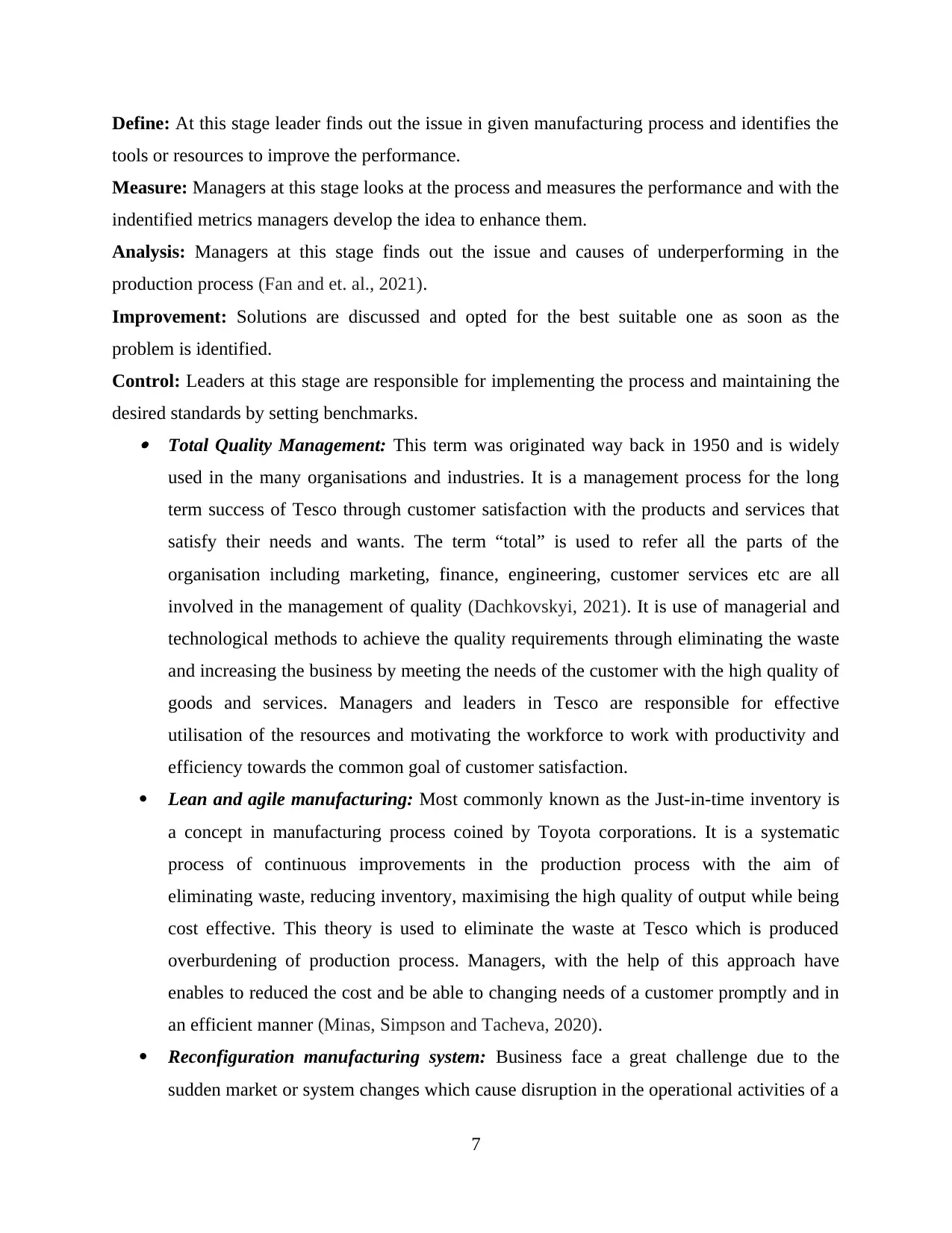
Define: At this stage leader finds out the issue in given manufacturing process and identifies the
tools or resources to improve the performance.
Measure: Managers at this stage looks at the process and measures the performance and with the
indentified metrics managers develop the idea to enhance them.
Analysis: Managers at this stage finds out the issue and causes of underperforming in the
production process (Fan and et. al., 2021).
Improvement: Solutions are discussed and opted for the best suitable one as soon as the
problem is identified.
Control: Leaders at this stage are responsible for implementing the process and maintaining the
desired standards by setting benchmarks. Total Quality Management: This term was originated way back in 1950 and is widely
used in the many organisations and industries. It is a management process for the long
term success of Tesco through customer satisfaction with the products and services that
satisfy their needs and wants. The term “total” is used to refer all the parts of the
organisation including marketing, finance, engineering, customer services etc are all
involved in the management of quality (Dachkovskyi, 2021). It is use of managerial and
technological methods to achieve the quality requirements through eliminating the waste
and increasing the business by meeting the needs of the customer with the high quality of
goods and services. Managers and leaders in Tesco are responsible for effective
utilisation of the resources and motivating the workforce to work with productivity and
efficiency towards the common goal of customer satisfaction.
Lean and agile manufacturing: Most commonly known as the Just-in-time inventory is
a concept in manufacturing process coined by Toyota corporations. It is a systematic
process of continuous improvements in the production process with the aim of
eliminating waste, reducing inventory, maximising the high quality of output while being
cost effective. This theory is used to eliminate the waste at Tesco which is produced
overburdening of production process. Managers, with the help of this approach have
enables to reduced the cost and be able to changing needs of a customer promptly and in
an efficient manner (Minas, Simpson and Tacheva, 2020).
Reconfiguration manufacturing system: Business face a great challenge due to the
sudden market or system changes which cause disruption in the operational activities of a
7
tools or resources to improve the performance.
Measure: Managers at this stage looks at the process and measures the performance and with the
indentified metrics managers develop the idea to enhance them.
Analysis: Managers at this stage finds out the issue and causes of underperforming in the
production process (Fan and et. al., 2021).
Improvement: Solutions are discussed and opted for the best suitable one as soon as the
problem is identified.
Control: Leaders at this stage are responsible for implementing the process and maintaining the
desired standards by setting benchmarks. Total Quality Management: This term was originated way back in 1950 and is widely
used in the many organisations and industries. It is a management process for the long
term success of Tesco through customer satisfaction with the products and services that
satisfy their needs and wants. The term “total” is used to refer all the parts of the
organisation including marketing, finance, engineering, customer services etc are all
involved in the management of quality (Dachkovskyi, 2021). It is use of managerial and
technological methods to achieve the quality requirements through eliminating the waste
and increasing the business by meeting the needs of the customer with the high quality of
goods and services. Managers and leaders in Tesco are responsible for effective
utilisation of the resources and motivating the workforce to work with productivity and
efficiency towards the common goal of customer satisfaction.
Lean and agile manufacturing: Most commonly known as the Just-in-time inventory is
a concept in manufacturing process coined by Toyota corporations. It is a systematic
process of continuous improvements in the production process with the aim of
eliminating waste, reducing inventory, maximising the high quality of output while being
cost effective. This theory is used to eliminate the waste at Tesco which is produced
overburdening of production process. Managers, with the help of this approach have
enables to reduced the cost and be able to changing needs of a customer promptly and in
an efficient manner (Minas, Simpson and Tacheva, 2020).
Reconfiguration manufacturing system: Business face a great challenge due to the
sudden market or system changes which cause disruption in the operational activities of a
7
⊘ This is a preview!⊘
Do you want full access?
Subscribe today to unlock all pages.

Trusted by 1+ million students worldwide
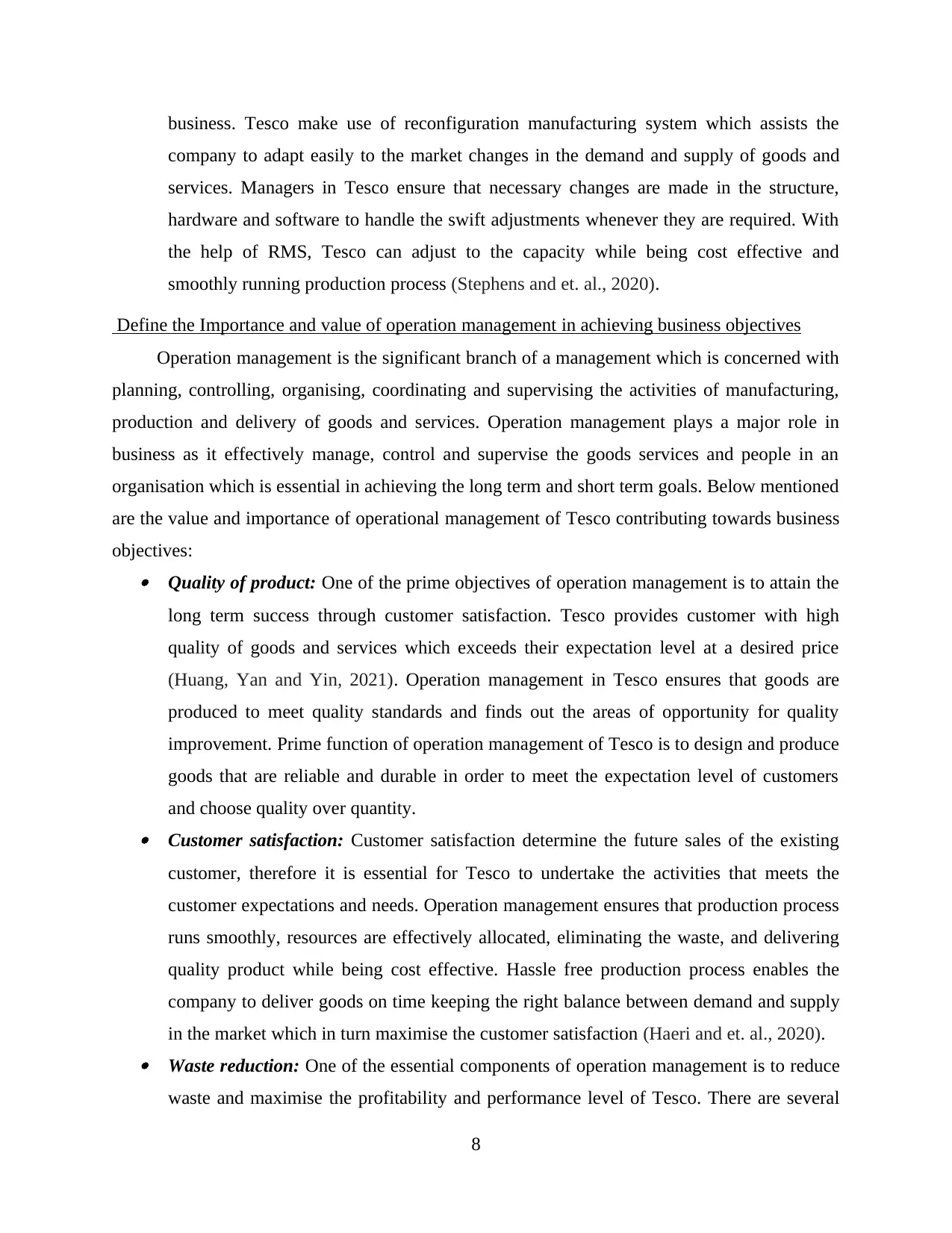
business. Tesco make use of reconfiguration manufacturing system which assists the
company to adapt easily to the market changes in the demand and supply of goods and
services. Managers in Tesco ensure that necessary changes are made in the structure,
hardware and software to handle the swift adjustments whenever they are required. With
the help of RMS, Tesco can adjust to the capacity while being cost effective and
smoothly running production process (Stephens and et. al., 2020).
Define the Importance and value of operation management in achieving business objectives
Operation management is the significant branch of a management which is concerned with
planning, controlling, organising, coordinating and supervising the activities of manufacturing,
production and delivery of goods and services. Operation management plays a major role in
business as it effectively manage, control and supervise the goods services and people in an
organisation which is essential in achieving the long term and short term goals. Below mentioned
are the value and importance of operational management of Tesco contributing towards business
objectives: Quality of product: One of the prime objectives of operation management is to attain the
long term success through customer satisfaction. Tesco provides customer with high
quality of goods and services which exceeds their expectation level at a desired price
(Huang, Yan and Yin, 2021). Operation management in Tesco ensures that goods are
produced to meet quality standards and finds out the areas of opportunity for quality
improvement. Prime function of operation management of Tesco is to design and produce
goods that are reliable and durable in order to meet the expectation level of customers
and choose quality over quantity. Customer satisfaction: Customer satisfaction determine the future sales of the existing
customer, therefore it is essential for Tesco to undertake the activities that meets the
customer expectations and needs. Operation management ensures that production process
runs smoothly, resources are effectively allocated, eliminating the waste, and delivering
quality product while being cost effective. Hassle free production process enables the
company to deliver goods on time keeping the right balance between demand and supply
in the market which in turn maximise the customer satisfaction (Haeri and et. al., 2020). Waste reduction: One of the essential components of operation management is to reduce
waste and maximise the profitability and performance level of Tesco. There are several
8
company to adapt easily to the market changes in the demand and supply of goods and
services. Managers in Tesco ensure that necessary changes are made in the structure,
hardware and software to handle the swift adjustments whenever they are required. With
the help of RMS, Tesco can adjust to the capacity while being cost effective and
smoothly running production process (Stephens and et. al., 2020).
Define the Importance and value of operation management in achieving business objectives
Operation management is the significant branch of a management which is concerned with
planning, controlling, organising, coordinating and supervising the activities of manufacturing,
production and delivery of goods and services. Operation management plays a major role in
business as it effectively manage, control and supervise the goods services and people in an
organisation which is essential in achieving the long term and short term goals. Below mentioned
are the value and importance of operational management of Tesco contributing towards business
objectives: Quality of product: One of the prime objectives of operation management is to attain the
long term success through customer satisfaction. Tesco provides customer with high
quality of goods and services which exceeds their expectation level at a desired price
(Huang, Yan and Yin, 2021). Operation management in Tesco ensures that goods are
produced to meet quality standards and finds out the areas of opportunity for quality
improvement. Prime function of operation management of Tesco is to design and produce
goods that are reliable and durable in order to meet the expectation level of customers
and choose quality over quantity. Customer satisfaction: Customer satisfaction determine the future sales of the existing
customer, therefore it is essential for Tesco to undertake the activities that meets the
customer expectations and needs. Operation management ensures that production process
runs smoothly, resources are effectively allocated, eliminating the waste, and delivering
quality product while being cost effective. Hassle free production process enables the
company to deliver goods on time keeping the right balance between demand and supply
in the market which in turn maximise the customer satisfaction (Haeri and et. al., 2020). Waste reduction: One of the essential components of operation management is to reduce
waste and maximise the profitability and performance level of Tesco. There are several
8
Paraphrase This Document
Need a fresh take? Get an instant paraphrase of this document with our AI Paraphraser
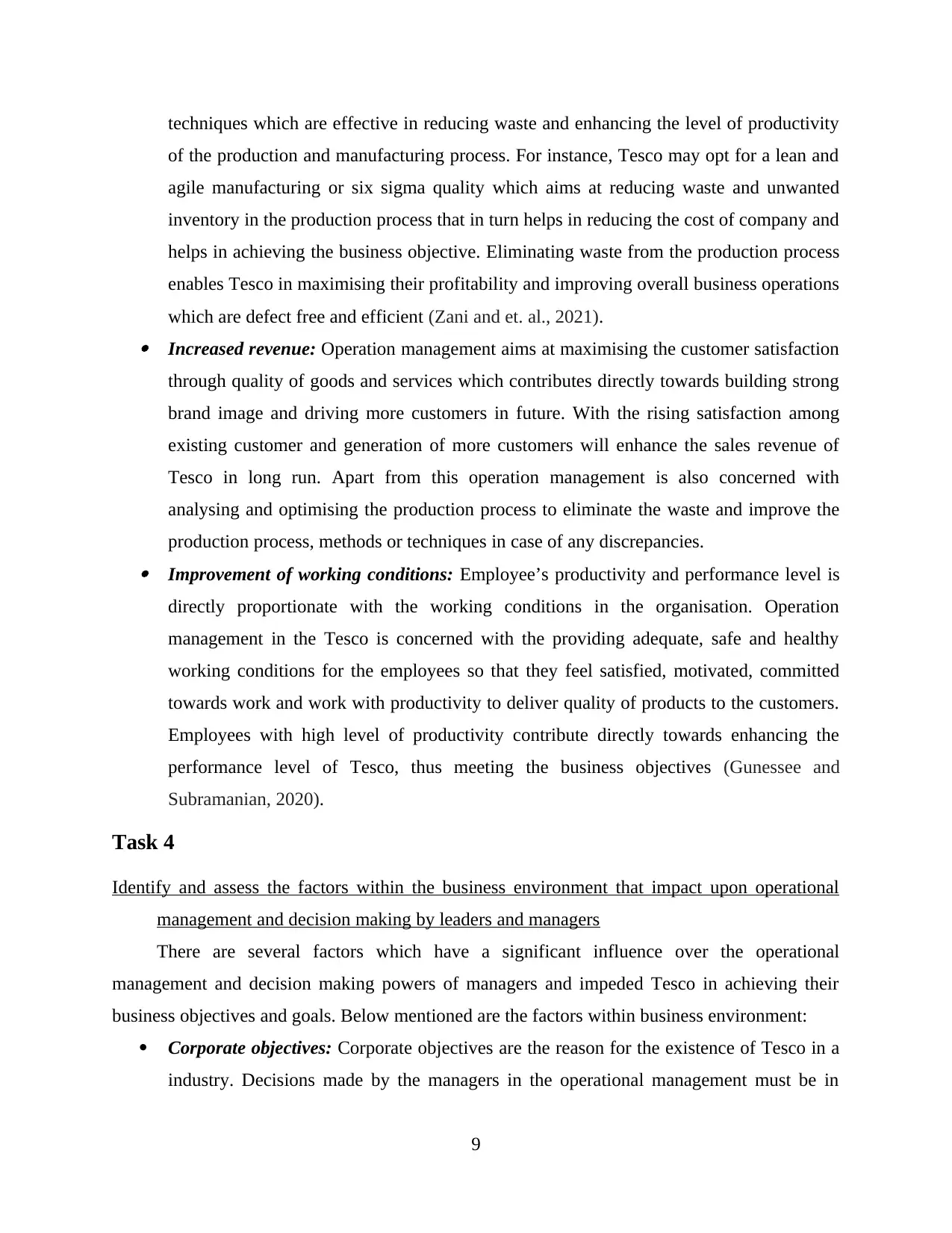
techniques which are effective in reducing waste and enhancing the level of productivity
of the production and manufacturing process. For instance, Tesco may opt for a lean and
agile manufacturing or six sigma quality which aims at reducing waste and unwanted
inventory in the production process that in turn helps in reducing the cost of company and
helps in achieving the business objective. Eliminating waste from the production process
enables Tesco in maximising their profitability and improving overall business operations
which are defect free and efficient (Zani and et. al., 2021). Increased revenue: Operation management aims at maximising the customer satisfaction
through quality of goods and services which contributes directly towards building strong
brand image and driving more customers in future. With the rising satisfaction among
existing customer and generation of more customers will enhance the sales revenue of
Tesco in long run. Apart from this operation management is also concerned with
analysing and optimising the production process to eliminate the waste and improve the
production process, methods or techniques in case of any discrepancies. Improvement of working conditions: Employee’s productivity and performance level is
directly proportionate with the working conditions in the organisation. Operation
management in the Tesco is concerned with the providing adequate, safe and healthy
working conditions for the employees so that they feel satisfied, motivated, committed
towards work and work with productivity to deliver quality of products to the customers.
Employees with high level of productivity contribute directly towards enhancing the
performance level of Tesco, thus meeting the business objectives (Gunessee and
Subramanian, 2020).
Task 4
Identify and assess the factors within the business environment that impact upon operational
management and decision making by leaders and managers
There are several factors which have a significant influence over the operational
management and decision making powers of managers and impeded Tesco in achieving their
business objectives and goals. Below mentioned are the factors within business environment:
Corporate objectives: Corporate objectives are the reason for the existence of Tesco in a
industry. Decisions made by the managers in the operational management must be in
9
of the production and manufacturing process. For instance, Tesco may opt for a lean and
agile manufacturing or six sigma quality which aims at reducing waste and unwanted
inventory in the production process that in turn helps in reducing the cost of company and
helps in achieving the business objective. Eliminating waste from the production process
enables Tesco in maximising their profitability and improving overall business operations
which are defect free and efficient (Zani and et. al., 2021). Increased revenue: Operation management aims at maximising the customer satisfaction
through quality of goods and services which contributes directly towards building strong
brand image and driving more customers in future. With the rising satisfaction among
existing customer and generation of more customers will enhance the sales revenue of
Tesco in long run. Apart from this operation management is also concerned with
analysing and optimising the production process to eliminate the waste and improve the
production process, methods or techniques in case of any discrepancies. Improvement of working conditions: Employee’s productivity and performance level is
directly proportionate with the working conditions in the organisation. Operation
management in the Tesco is concerned with the providing adequate, safe and healthy
working conditions for the employees so that they feel satisfied, motivated, committed
towards work and work with productivity to deliver quality of products to the customers.
Employees with high level of productivity contribute directly towards enhancing the
performance level of Tesco, thus meeting the business objectives (Gunessee and
Subramanian, 2020).
Task 4
Identify and assess the factors within the business environment that impact upon operational
management and decision making by leaders and managers
There are several factors which have a significant influence over the operational
management and decision making powers of managers and impeded Tesco in achieving their
business objectives and goals. Below mentioned are the factors within business environment:
Corporate objectives: Corporate objectives are the reason for the existence of Tesco in a
industry. Decisions made by the managers in the operational management must be in
9
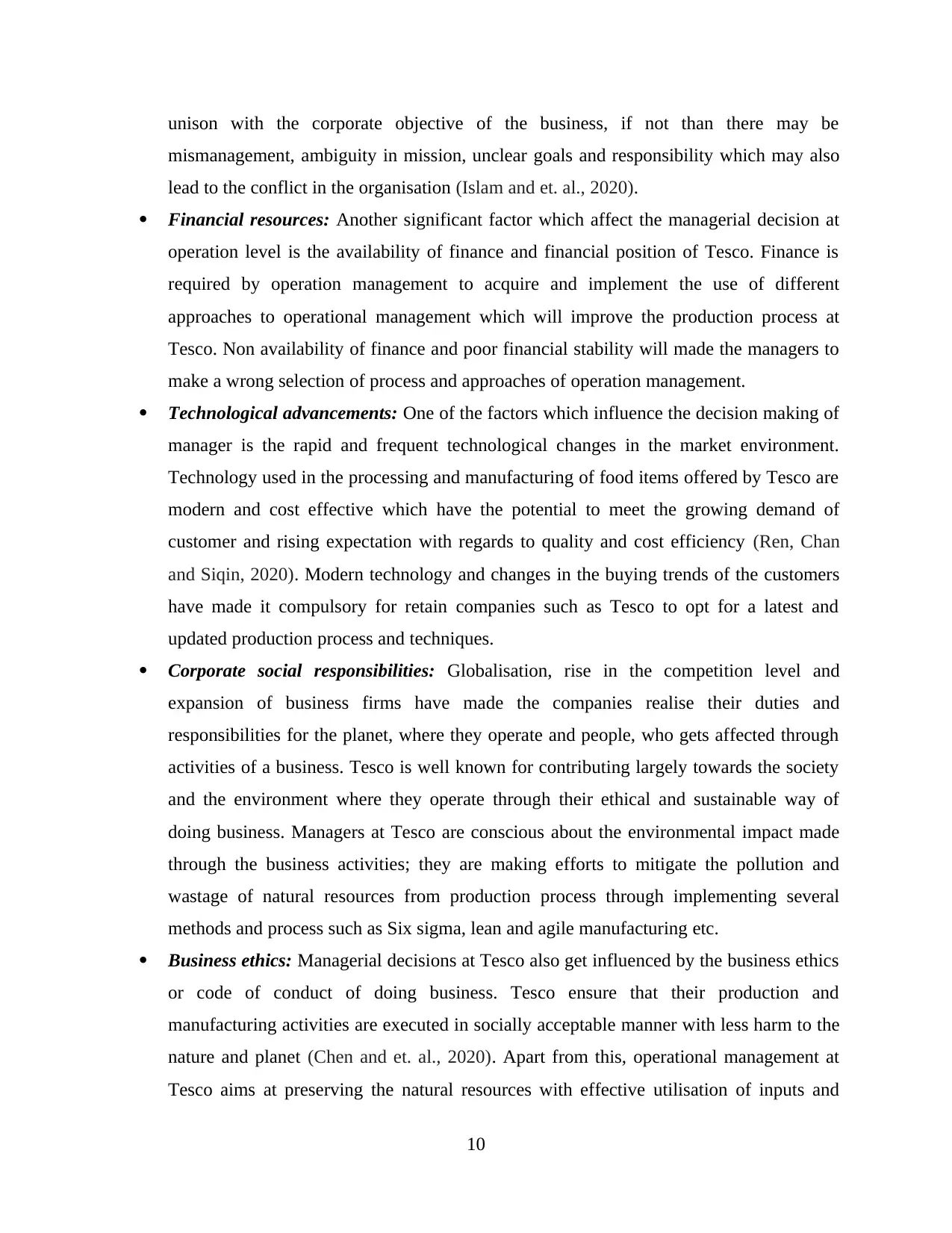
unison with the corporate objective of the business, if not than there may be
mismanagement, ambiguity in mission, unclear goals and responsibility which may also
lead to the conflict in the organisation (Islam and et. al., 2020).
Financial resources: Another significant factor which affect the managerial decision at
operation level is the availability of finance and financial position of Tesco. Finance is
required by operation management to acquire and implement the use of different
approaches to operational management which will improve the production process at
Tesco. Non availability of finance and poor financial stability will made the managers to
make a wrong selection of process and approaches of operation management.
Technological advancements: One of the factors which influence the decision making of
manager is the rapid and frequent technological changes in the market environment.
Technology used in the processing and manufacturing of food items offered by Tesco are
modern and cost effective which have the potential to meet the growing demand of
customer and rising expectation with regards to quality and cost efficiency (Ren, Chan
and Siqin, 2020). Modern technology and changes in the buying trends of the customers
have made it compulsory for retain companies such as Tesco to opt for a latest and
updated production process and techniques.
Corporate social responsibilities: Globalisation, rise in the competition level and
expansion of business firms have made the companies realise their duties and
responsibilities for the planet, where they operate and people, who gets affected through
activities of a business. Tesco is well known for contributing largely towards the society
and the environment where they operate through their ethical and sustainable way of
doing business. Managers at Tesco are conscious about the environmental impact made
through the business activities; they are making efforts to mitigate the pollution and
wastage of natural resources from production process through implementing several
methods and process such as Six sigma, lean and agile manufacturing etc.
Business ethics: Managerial decisions at Tesco also get influenced by the business ethics
or code of conduct of doing business. Tesco ensure that their production and
manufacturing activities are executed in socially acceptable manner with less harm to the
nature and planet (Chen and et. al., 2020). Apart from this, operational management at
Tesco aims at preserving the natural resources with effective utilisation of inputs and
10
mismanagement, ambiguity in mission, unclear goals and responsibility which may also
lead to the conflict in the organisation (Islam and et. al., 2020).
Financial resources: Another significant factor which affect the managerial decision at
operation level is the availability of finance and financial position of Tesco. Finance is
required by operation management to acquire and implement the use of different
approaches to operational management which will improve the production process at
Tesco. Non availability of finance and poor financial stability will made the managers to
make a wrong selection of process and approaches of operation management.
Technological advancements: One of the factors which influence the decision making of
manager is the rapid and frequent technological changes in the market environment.
Technology used in the processing and manufacturing of food items offered by Tesco are
modern and cost effective which have the potential to meet the growing demand of
customer and rising expectation with regards to quality and cost efficiency (Ren, Chan
and Siqin, 2020). Modern technology and changes in the buying trends of the customers
have made it compulsory for retain companies such as Tesco to opt for a latest and
updated production process and techniques.
Corporate social responsibilities: Globalisation, rise in the competition level and
expansion of business firms have made the companies realise their duties and
responsibilities for the planet, where they operate and people, who gets affected through
activities of a business. Tesco is well known for contributing largely towards the society
and the environment where they operate through their ethical and sustainable way of
doing business. Managers at Tesco are conscious about the environmental impact made
through the business activities; they are making efforts to mitigate the pollution and
wastage of natural resources from production process through implementing several
methods and process such as Six sigma, lean and agile manufacturing etc.
Business ethics: Managerial decisions at Tesco also get influenced by the business ethics
or code of conduct of doing business. Tesco ensure that their production and
manufacturing activities are executed in socially acceptable manner with less harm to the
nature and planet (Chen and et. al., 2020). Apart from this, operational management at
Tesco aims at preserving the natural resources with effective utilisation of inputs and
10
⊘ This is a preview!⊘
Do you want full access?
Subscribe today to unlock all pages.

Trusted by 1+ million students worldwide
1 out of 15
Related Documents
Your All-in-One AI-Powered Toolkit for Academic Success.
+13062052269
info@desklib.com
Available 24*7 on WhatsApp / Email
![[object Object]](/_next/static/media/star-bottom.7253800d.svg)
Unlock your academic potential
Copyright © 2020–2026 A2Z Services. All Rights Reserved. Developed and managed by ZUCOL.





